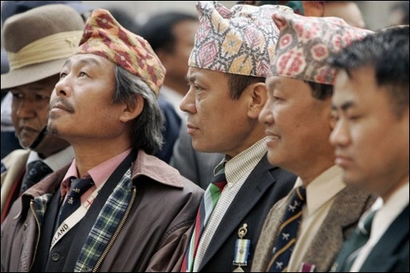
Sometimes I feel helpless thinking the criteria one needs to get permission to reside on so called ‘their territory’. Being a college
student but unfortunately belonging to a farmer’s family in Nepal, I got married early. In Nepal early is very early…I got married when I was 18 and now I have three children, living in India like thousands of other, who slips into the Indian boundary in search of a better life away from Maoist ideology and deep rooted principles of harsh monocracy.
So this is a brief introduction of me, who had gone through many ups and downs in a very short span of life esp. covering a very short distance from Nepal to India. Coming back to the point where helplessness is the very encouragement of writing this story.
While moving away from the bunker I had dug in the backyard of my house, fearing Maoists, where I lived for three months along with my pregnant wife made me realize that what a coward I am. I was able to guess from her face that she don’t approve of me hiding for the fear of death and while I gave the lowdown of a better life on other side of the fence, in India.
So, moving away from the bunker, it was obscure of what life we’ll lead here in India but then it was obvious that we will survive, though unfamiliar with the kind of treatment the ‘locals’ shower on the very first sight of what they call ‘Ghorkhas’, I along with my family stepped the fast moving life on this side of the fence.
Although, 1950 Indo-Nepal Treaty of Peace and Friendship provides for agreement about movement of people between two countries and some other aspects of bilateral relations that also mentions some rights like related to Labour.
When I moved to India in a hope to get rid of the trap that Maoist activists and political instability of Nepal has weaved, I was unaware of the truth. The struggle against absolute monarchy gave birth to such conditions, which hinders sufficient economic development. Owing to these two problems, Maoist threat of massacre on not being assisted by the local peasants and government laws that seems to be similarly cruel in punishments for assisting Maoist activists, we are helpless to avoid, so called infiltration, into the lap of much developed neighborhood, which had promised to extend its hand at the time of need.
Not only Nepalese are discriminated in matters of rights, but due to lack of identification suffers blames for crimes, which are just imposed on the basis of being a refugee. The treaty provides for free education of our children, which is not possible for we are not able to prove our identification in the lack of any documents. Neither are we allowed to open any bank account, which makes it a cumbersome business to send money to our disabled or aged relatives who could not cross the boarder with us. The one carrying money will have to satisfy security officials at borders, of course, by giving something out of that amount or will face a robbery. 1950 Indo-Nepal treaty accords Nepali residents in India the same rights as Indians, and therefore they do not qualify as refugees. But, in any case of death or injury at work, Nepalese find themselves devoid of any compensation or fair wages.
However, how can an outsider hope for fairness from a Country, where even its own residents who are poor like us, share the same
fate. I can admire Maoist for their ideology that allowed even dalits to live equally without any discrimination, may be for a short period that we are free to breathe like others.



